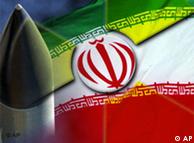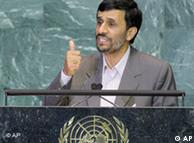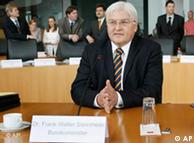International Relations | 24.09.2008
German Minister Fears Impact of Tense US-Russian Ties
Germany's foreign minister warned Wednesday recent tensions between Moscow and Washington could worsen a number of world crises after high-level talks on Iran's disputed nuclear program were scrapped.
Speaking to reporters on the sidelines of the UN General Assembly in New York on Wednesday, Sept 24, Steinmeier said he was "very worried" that worsening relations between Moscow and Washington could hamper ongoing efforts to defuse conflicts around the world.
"I hope we can, in the medium-term, return to discussion forums we need because none of the international crises, from the Middle
East to the Caucasus, Iran -- we see it also in the six-party talks on North Korea, can be resolved if we do not have the two big
players, Russia and the US, on board," he said.
Steinmeier said the US decision to pull out of a planned meeting of foreign ministers from the Group of Eight industrialized nations had led Russia on Tuesday, in a tit-for-tat move, to drop out of talks of the so-called 3+3 on Iran bringing together the United States, Russia, China, France, Britain and Germany.
The German foreign minister said the meeting had been especially urgent given that the UN nuclear watchdog, IAEA, said in a recent report that Iran was not cooperating with its investigation of the country's nuclear program.
"We're going in the wrong direction, I am completely convinced of that," Steinmeier said.
"There is no question that without such a meeting, which we urgently need in the current situation, it will be more difficult to bring the necessary international pressure to bear," Steinmeier told reporters earlier.
"No Iranian fires to put out"
 Bildunterschrift: Großansicht des Bildes mit der Bildunterschrift: There are enough issues to address at the UN without discussing Iran, the Russians said
Bildunterschrift: Großansicht des Bildes mit der Bildunterschrift: There are enough issues to address at the UN without discussing Iran, the Russians said
The Russians insisted that scheduling problems had led to its pull-out at the planned meeting of the 3+3 on Iran.
"We do not see any fire that requires us to toss everything aside and meet to discuss Iran's nuclear program in the middle of a packed week at the United Nations General Assembly," the Russian foreign ministry said in a statement.
Relations between Washington and Moscow have been tense since the five-day Georgia war last month. The US has recently attempted to exclude Russia from several G8 conference calls and called for internationally isolating Moscow.
In his final speech at the General Assembly, US President George W. Bush accused Russia of having violated the UN charter with what his administration has called a premeditated invasion of Georgia, a former Soviet territory.
The Russian Foreign Ministry called on the US to declare how it intended to maintain relations with Russia.
"It would be very desirable for Washington to finally decide what it wants in its relations with Moscow," the foreign ministry said in a statement. "If it wants to punish Russia, this is one thing. If it agrees we have common interests ... that is another."
Iranian enrichment continues
 Bildunterschrift: Großansicht des Bildes mit der Bildunterschrift: Ahmadinejad said Iran would continue its nuclear program
Bildunterschrift: Großansicht des Bildes mit der Bildunterschrift: Ahmadinejad said Iran would continue its nuclear program
While officials in Moscow and Washington mull their scope of their future relations, Steinmeier said "silence" between Russia and other world powers "does not solve any problems."
"The case of Iran shows even more that we must remain in talks, with Russia as well, and demonstrate the necessary pressure, the decisiveness and the resolve of the international community," he said.
Despite three rounds of UN Security Council sanctions, Iran continues to defy demands that it halt uranium enrichment -- a process the West and Israel fear is being used to make an atomic bomb.
Tehran insists that its nuclear energy program is entirely peaceful and aimed at generating electricity.
Iranian President Mahmoud Ahmadinejad told the General Assembly on Tuesday that Tehran would pursue nuclear technology despite Western "bullying."

Comments